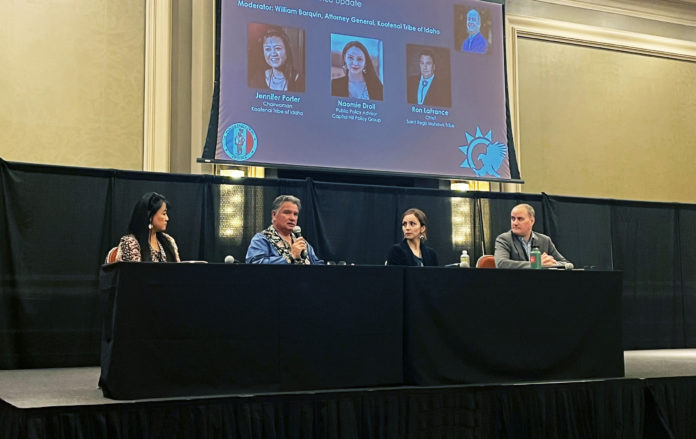
AKWESASNE, NY – Saint Regis Mohawk Tribal Chief Ron LaFrance recently joined members of the Jay Treaty Border Alliance for the 2022 Tribal Border Summit held at the Casino Del Sol Resort in Tucson, AZ. Hosted by the Pascua Yaqui’s Tribal Border Alliance, the gathering provided an opportunity to share developments and ongoing efforts to address issues associated with Indigenous border communities.
Tribal Chief Ron LaFrance served on a Northern Border Panel that was coordinated by the Jay Treaty Border Alliance. Chief LaFrance was joined by Kootenai Tribe of Idaho Chairwoman Jennifer Porter and Capitol Hill Policy Group Advisor Naomie Droll. The Northern Border Panel discussion was moderated by Kootenai Tribe of Idaho Attorney General William Barquin.
Chief LaFrance opened the panel discussion with an overview of the Saint Regis Mohawk Tribe and its experiences with the international border that was placed between the U.S. and Canada. He spoke about the need for Akwesashró:non (People of Akwesasne) to freely cross the border for the purpose of traveling within the Akwesasne Territory.
“As an Indigenous community bisected by an international border, our community members must travel the border multiple times each day for work, school, shopping, or for other daily needs,” said Chief LaFrance. “The ability of our members to travel within their own territory is an inherent and historic right that predates either country’s formation.”
Tribal governments have the right to determine their own membership however, the U.S. Immigration and Nationality Act (1952) requires Indigenous people to prove their blood quantum when entering the United States. Removal of the blood quantum requirement from the federal legislation has been an ongoing effort of the Saint Regis Mohawk Tribal Council.
In doing so, the Tribal Council has helped increase awareness of the community’s unique travel needs and has fostered a working relationship with U.S. Customs and Border Protection, U.S. Department of Homeland Security, and other border enforcement agencies. The Tribal Council convenes at monthly meetings with border agencies to discuss policies and developments that impact the ability of the Akwesasne people to cross the border.
The Jay Treaty Border Alliance has introduced legislation during each of the congressional sessions since 2018 to remove the blood quantum provision. The most recent version of the legislation, H.R. 4228, Tribal Border Crossing Parity Act, is currently before the U.S. House Judiciary Committee and recognizes the border crossing rights of Indigenous people born in the U.S. or Canada who are a member or eligible for membership with a federally recognized tribe in either country.
Backed by the National Congress of American Indian’s Resolution #PHX-16-003 (2016), support is growing to remove the termination-era language from the Immigration and Nationality Act that has created unnecessary tension between border agencies and Indigenous communities.
The Tribal Border Summit adjourned with a desire to meet annually to strengthen lobbying efforts aimed at ending the requirement for Indigenous people to carry proof that they possess at least 50 percent American Indian blood.














































